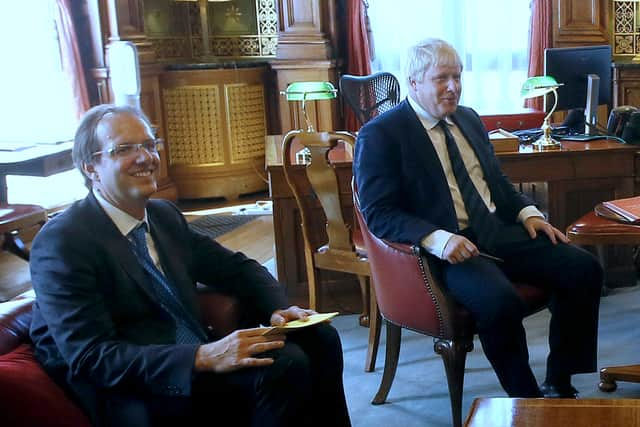Downing Street party: May 2020 Covid rules set by Boris Johnson revisited - did No 10 garden event break law?
and live on Freeview channel 276
Boris Johnson attended another No 10 gathering during the first lockdown days after the wine and cheese ‘work meeting’, reports claim.
The Prime Minister and his then fiancée Carrie were allegedly among 30 people who were at the “bring your own booze” party, according to ITV.
Advertisement
Hide AdAdvertisement
Hide AdA leaked email from Martin Reynolds, the Prime Minister’s principal private secretary, shows he invited more than 100 Downing Street employees asking them to “make the most of the lovely weather”.
No 10 said it would not be commenting on the allegations while Sue Gray’s probe is under way.
The email from Mr Reynolds relates to an event said to have taken place on 20 May, 2020.
A leaked photograph of the Prime Minister and officials drinking in the No 10 garden on 15 May, 2020 – five days before the “bring your own booze” event that Mr Reynolds invited colleagues to – showed the principal private secretary sat at the same table as Mr Johnson.
Advertisement
Hide AdAdvertisement
Hide AdSo, what were the Covid restrictions in place at that time? Here’s all you need to know.


What were the Covid rules in place during the first lockdown?
England was in national lockdown between 23 March and 1 June 2020 - until schools started to reopen - though restrictions were in place from one week before the official lockdown was announced.
- From 16 March, the public were told to avoid non-essential travel and social contact and to work from home where possible.
- Schools are told to close from 20 March until further notice, except for the children of key workers and vulnerable pupils.
- On 20 March, restaurants, cafes and pubs were told to close.
- From 23 March, all “non-essential” high street businesses were closed and people were ordered to stay at home, permitted to leave for essential purposes only, such as buying food or for medical reasons.
- Starting on 10 May, the laws were slowly relaxed with people allowed to go to work, if they could not work from home, but they were told to avoid public transport.
- From 13 May, people were also permitted to leave home for outdoor recreation (beyond exercise) and could meet one other person outdoors.
- On 1 June, the restriction on leaving home was replaced with a requirement to be home overnight, and people were permitted to meet outside in groups of up to six people.
- On 23 June, the two metre social distancing rule was brought into place.
- On 29 June, then health secretary Matt Hancock announced that local lockdowns were being brought into place, with parts of Leicestershire and Leicester the first to face the new rules.
- From 4 July, the Prime Minister announced that pubs, restaurants and hairdressers could reopen, providing they adhered to Covid secure guidelines.
- From the same date, he set out that two households could meet up in any setting with social distancing measures, and that people could enjoy ‘staycations’ in England with the reopening of accommodation sites.
What were the rules surrounding gatherings on 20 May, 2020?
The initial fine for attending a party in the first national Covid lockdown was £60.
However, if the case was sent to court, people were asked to fork out much more.
Advertisement
Hide AdAdvertisement
Hide AdBetween 27 March, 2020 and 20 June, 2021 police handed out 366 £10,000 Fixed Penalty Notices (FPNs) for large gatherings over 30 people in England and Wales, according to the National Police Chiefs Council.
A FPN is an alternative to prosecution before the magistrate’s court. It includes a fine, and in many cases penalty points too.
During the same time period, 117,213 Fixed Penalty Notices were issued for all Covid breaches.
During the first national lockdown (weeks 1-9 of lockdown restrictions, before the “stay at home” order was lifted) an average of 1,691 FPNs were issued per week.
Advertisement
Hide AdAdvertisement
Hide AdThis covers the period of both alleged Downing Street garden gatherings.
Those issued with an FPN could choose to not pay the associated fine and contest it. If they did not pay, the person could face criminal proceedings related to their alleged offence.
Those convicted of a coronavirus offence at court are punished by a fine set by the Magistrate hearing their case.
The law was further relaxed on 4 July so that lockdown laws only regulated large gatherings.
A message from the editor:
Advertisement
Hide AdAdvertisement
Hide AdThank you for reading. NationalWorld is a new national news brand, produced by a team of journalists, editors, video producers and designers who live and work across the UK. Find out more about who’s who in the team, and our editorial values. We want to start a community among our readers, so please follow us on Facebook, Twitter and Instagram, and keep the conversation going. You can also sign up to our newsletters and get a curated selection of our best reads to your inbox every day.
Comment Guidelines
National World encourages reader discussion on our stories. User feedback, insights and back-and-forth exchanges add a rich layer of context to reporting. Please review our Community Guidelines before commenting.
